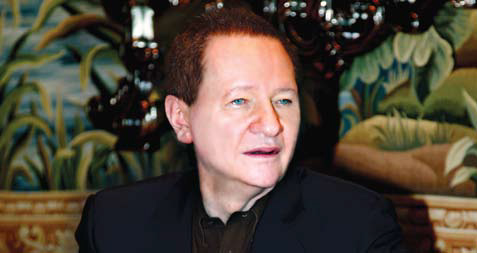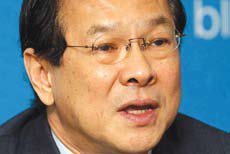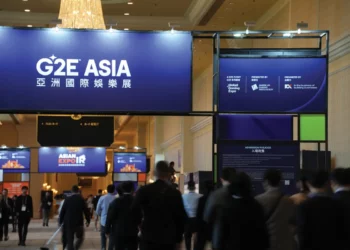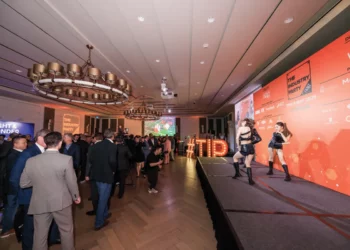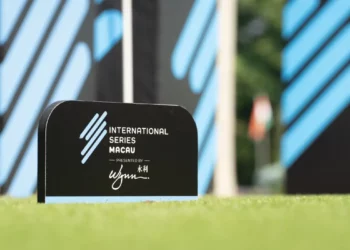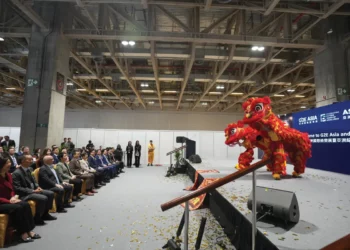11 Angela Leong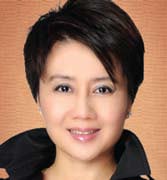
Executive Director
SJM Holdings
Casino operator, corporate executive, developer and entrepreneur, lawmaker, political advisor, philanthropist, mother of five—few individuals, let alone females, play as multifarious and influential a role in the world of Asian gaming as Angela Leong.
Stanley Ho’s sister Winnie records in her autobiography how the tycoon himself paid tribute to the ambition of the redoubtable “Fourth Wife”, who “Unlike other women would rather venture into business than simply take 100,000 Macanese patacas [a month].”
Tough, resolute, as quick a study as they come in the lineaments of power, the 51-year-old Guangzhou native, the youngest and the last of Dr Ho’s consorts, enlivens what can be the most bloodless of industries with a true Cinderella story.
Born Xuan Wei Ling in the privileged household of an officer in the PLA, her childhood abruptly came to an end at 13 when her father died. Forced to fend for her family, she entered a staterun dance school, where she excelled and won a coveted spot in a renowned Guangdong dance troupe. At 20 she left for Macau to seek her fortune. She began teaching dance and aerobics. She saved her money. She dabbled in real estate. She changed her name to Liang Anqi. She did it for luck. It would prove auspicious. One of her students was a brother of Stanley Ho. He wrangled her a day job in one of the count rooms of STDM, Sociedade de Turismo e Diversoes de Macau, the casino monopoly Dr Ho had held for decades. He also introduced her to his billionaire sibling, an avid ballroom dancer and 30 years her senior. Whether it was love at first dip must be left to the imagination.
Today, “Fourth Wife” is the largest individual shareholder in the largest casino operator in the largest gambling market on the planet. She is a director of STDM, SJM Holdings’ majority shareholder, and holds one of STDM’s largest personal equity stakes. She owns 10% of SJM’s operating company, Sociedade de Jogos de Macau, where she serves as managing director. Her real estate holdings, described as “vast” by The Wall Street Journal, include a reputed 45% of L’Arc Macau, a 56-story mixed-use colossus containing a hotel, private residences, retail shops and a 10,000-square-meter casino that operates as a “satellite” of SJM’s gambling concession, one of 14 such venues in the company’s portfolio.
One of the really fascinating elements of this rags-to-riches tale is the ability it has conferred on its heroine to shape the future of the industry, of the city where she has made her fortune, and of greater China. She has readily grasped it, too, serving as a member of the Jiangxi Provincial and Zhuhai Municipal committees of the Chinese People’s Political Consultative Conference and working through a second term in the Macau Legislative Assembly as a representative of one of several pro-business, pro-Beijing factions. Her charity work notably includes a longstanding involvement with Po Leung Kuk, a 130-year-old institution founded in Hong Kong to provide services to needy women and girls.
As an operator she has acquired a reputation as a solid contributor to SJM’s growth in an increasingly competitive marketplace, reflected, in part, in the fact that for several years now she has headed the trade group representing the city’s junket operators and promoters. “She’s got relationships with big players,” an executive with a competing concession once said of her, “and she can move money.”
Since winning effective control of SJM last year, Ms Leong has been talking up a non-gaming leisure complex she believes would go a long way toward diversifying Macau’s tourist offering. Priced at more than US$1 billion, consisting of several resort hotels and a theme park featuring an indoor beach and an equestrian center, it’s probably on hold for now while SJM continues to monitor a worrisome softness in the VIP sector and waits for the government to approve its application for land that will enable it to jump into the fray on Cotai.
Ms Leong, needless to say, is undaunted. She is, she said in a 2011 interview in the Journal, like the ballerina in the hit movie “Black Swan”.
“I felt just like that as a child dancer,” she said, “dancing until the skin came off. It hurts, but you still practice. If you’re injured, you keep dancing. When some people do something, they do it for two minutes and they’re done. When I do something now, I must do it for one hour.”

12 Linda Chen
Executive Director and COO
Wynn Macau
Director, Wynn Resorts
Linda Chen isn’t the only woman to hold a position of prominence in Asian gaming. She isn’t the most powerful either, depending on how you define that term. But there is not another in the industry who can lay claim to the breadth of her hands-on experience, her institutional knowledge or the respect in which she is held by her peers.
And for sure she is the only one with the lucky digits 8888 as part of her mobile phone number, a personal gift from her boss and biggest fan, Steve Wynn.
Touted by Forbes earlier this year as a possible successor to the billionaire chairman of Wynn Resorts and Wynn Macau, the 45-year-old Ms Chen heads strategic development and overall marketing for the five-star Wynn portfolio in Macau, which in the next few years will include an even grander monument to luxury escapism on Cotai, while as president of Wynn International Marketing her responsibilities extend to the Las Vegas Strip as well, vesting her with a global perspective shared by few in the industry.
Low-key, effective, eminently well-connected—she is a member of the Nanjing Committee of the Chinese People’s Political Consultative Conference (Macau) and Mr Wynn’s personal representative to the government of the PRC—insiders describe her as the force behind the scenes of the company’s competitiveness in Macau’s all-important VIP sector, managing key relationships, maintaining corporate credibility, refusing the temptation to overpay for business as some have and making it stick as a policy geared to long-term growth.
Mr Wynn has referred to her as “a member of my family … virtually one of my own daughters.” But then the two go back a long way. She was an eyewitness to the dawn of the new Las Vegas, having worked on the opening of The Mirage back in 1989, fresh out of Cornell University’s prestigious School of Hotel Administration. At 31, she was Bellagio’s executive vice president of international marketing and stayed on in that role after Mirage Resorts was purchased by MGM Grand (now MGM Resorts International). She rejoined her mentor in the run-up to the listing of Wynn Resorts on Nasdaq and the opening of Wynn on the Las Vegas Strip, and in 2003 moved to Macau to play a pivotal role in the opening of Wynn Macau, where she has overseen the growth of the listed China subsidiary into a company worth US$3.8 billion last year in operating revenues.
In 2010, Wynn Resorts made Ms Chen the fifth-highest-paid executive among Las Vegas-based companies—and the first women to crack the top 10—with a 10-year contract that matches Mr Wynn’s own in duration and paid her US$6.2 million last year. The contract included a $10 million bonus. The company also provided her a $5 million home for her use in Macau.
At 70, Steve Wynn is accustomed to talk in the media about an heir apparent and invariably he brushes it aside. But at one point earlier this year the question came up, and he replied cagily: “If you ask me who could do it? A Chinese woman.”
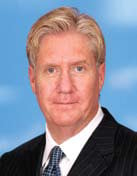
13 Edward Tracy
President, CEO, Executive Director
Sands China
Ed Tracy was nowhere in the picture back when Sheldon Adelson first envisioned building a company around which Macau could be made into an Asian Las Vegas. But if he had been, the path to its realization might have been a bit straighter and a lot smoother.
Much like his immediate superior, Michael Leven, the avuncular COO of Sands China parent Las Vegas Sands Corp, Mr Tracy has brought stable growth to a company which for all its size and obvious influence in the marketplace hasn’t benefited from a lot of stability at the top. His effectiveness is borne out by the numbers. Net revenues across Sands China’s three operating resorts last year were up 17.8%, with all segments of the business showing robust gains. Total gaming revenue was up 15.5%, driven by a notable increase (16.6%) in rolling chip volume, which has been one of the keys to evaluating his performance as CEO, a title he’s held only since last July.
His marching orders at that time were to re-establish the company as a force at the high end of the market, and this he has done, restoring junket relationships that had been allowed to wither under previous management and building new ones. As a special advisor and later a member of the board of directors’ Capital Expenditure Committee he’s plowed money into The Venetian Macao’s high-limit areas, and he’s overseen an expansion and improvements next door that have considerably enhanced the appeal of the Plaza Macao Casino as a VIP destination.
This year, rolling chip volume was up almost 12% at The Venetian in the first quarter, compared to the same period in 2011. It more than quadrupled at the Plaza (+221.8%). The momentum carried into the second quarter, with rolling volume company-wide growing by 36.3% (174.4% at the Plaza). Including 81 days of results from Sands Cotai Central, which opened in April with 145 VIP tables, gross gaming revenue in the sector was up a heady 161%. In terms of growth rate, the second quarter saw Sands China outperform the market in all three gaming segments—rolling volume, non-rolling drop and slot handle—for the first time since 2008. Its share of Macau’s total GGR, factoring in the addition of Sands Cotai Central, grew during the quarter by more than 100 bps to 17.7%.
It’s been good growth, too, smartly managed. Adjusted EBITDA hit a record US$456.4 million in the first quarter on a sparkling operating margin of 32.1%. The second quarter’s 29.5% operating margin drove a 9.6% increase in adjusted EBITDA over 2Q11 to $429 million. While on the non-gaming side, hotel and retail revenues were up 19% and 30%, respectively, in the first quarter, and 24% and 37.1% in 2Q, with the added capacity on Cotai.
Not too shabby, considering that Mr Tracy was new to China when he arrived in 2010 at the age of 57 with 20 years of industry experience under his belt, all of it in North America, marked by a stint in the late ’80s and early ’90s as Donald Trump’s CEO in Atlantic City and later as head of a chain of US riverboat casinos.
His stabilizing presence has been evident as well in improved relations with the government of the SAR, which could pave the way for lucrative sales of luxury apartments at the Plaza’s Four Seasons host hotel and may have helped to win the company a four-year extension to develop its Parcel 3 site on the Cotai Strip next to the Four Seasons.
Shareholder relations have been bolstered, too, thanks to the board’s decision earlier this year, which some credit to Mr Tracy’s influence, to authorize Sands China’s first dividend.
He also gets high marks for employee relations. He lives at The Venetian, where workers are likely to see him any time of day or night, and he is said to go out of his way to take an interest in their wellbeing. It’s an area many in upper management tend to overlook, and it’s a pretty big deal for a company with a staff of 21,000.
In terms of his own position, he received a sizable vote of confidence this summer with a contract renewal through August 2013 and options on 260,000 shares of stock to add to 1,225,000 options he held at the end of last year.
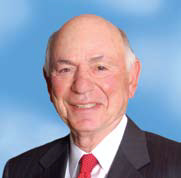
14 Michael Leven
President and COO
Las Vegas Sands Corp
Sheldon Adelson called Michael Leven the most competent and productive businessman he has ever worked with during the June announcement that Mr Leven’s contract with Las Vegas Sands Corp had been extended through 2014.
While Mr Adelson is known as the visionary, Mr Leven is often referred to as the man who gets things done. As he explained to Inside Asian Gaming, “I think when you’re a chief operating officer the job is getting things done. You can do some strategy, but you better make sure it gets executed, so I’m the one that has to take Mr Adelson’s vision and make sure it happens.”
Since taking on that job in 2009, Mr Leven has helped guide LVS to several milestones: the Marina Bay Sands and Sands Bethlehem openings; Sands China’s US$2.5 billion IPO; several billions of debt paid down or refinanced; fresh momentum injected into Cotai via partnerships with Hilton Worldwide, Intercontinental Hotels Group and Starwood; a 10-year deal struck with InterContinental to crossmarket The Venetian and Palazzo in Las Vegas with IHG’s 180 millionstrong data base; and, last but not least, management stability largely restored at the corporate and property levels.
Whereas Marina Bay Sands has emerged as perhaps the most profitable casino in the world, the latest addition to LVS’ Asian portfolio appears to have got off to a disappointing start. The US$4.4 billion Sands Cotai Central in Macau opened at a time when VIP gaming revenue growth is slowing, and it has been accused of cannibalizing Sands China’s other Macau properties. It also signals a drastic reduction in the company’s returns on its Asian investments. Whereas The Venetian Macao and Marina Bay Sands are comfortably exceeding the company’s expected 20% ROI, the $51.8 million adjusted property EBITDA generated by Sands Cotai Central during the 81 days it was open in the second quarter falls short of that mark.
Granted, the property is still ramping up, with the second phase scheduled to be unveiled this month, and the new amenities therein could well boost its appeal. Also, SCC is the continuation of Sands’ penchant for being more aggressive than any other Macau casino operator in developing non-gaming amenities. As SCC hits its stride following the Phase II opening, Mr Leven says it could emerge as “a game-changer for MICE in Macau”.
As a veteran hotelier he would know. A former president of Days Inn and Holiday Inn Worldwide, he founded a company that developed the Microtel and Hawthorne Suites brands. He and Mr Adelson have known each other for decades, from the days when Mr Adelson was operating charter tours. Later, when Mr Adelson owned the Comdex computer trade show and Mr Leven was running Days Inn, they’d meet occasionally for dinner. He declined an offer to run the Sands when Mr Adelson bought the venerable Las Vegas Strip resort in 1988. But when Mr Adelson took Las Vegas Sands Corp public in 2004, Mr Leven accepted a seat on the board of directors and served for about a year.
Under his extended contract, he will be guiding LVS to further expansion in Asia. In addition to the second phase of Sands Cotai Central, the company is developing a fourth Cotai site, known as Parcel 3, where Mr Leven says he hopes to be “putting pylons in the ground” by November. The company also continues exploring other opportunities across the region, with particular focus on Japan, Korea and Vietnam.

15 Michael Mecca
President and COO
Galaxy Entertainment Group
Last month, Galaxy Entertainment Group released results for the first half of 2012, once again exceeding analysts’ forecasts, and that’s in addition to the expected year on- year boost to its bottom line from a full six months of operation at Galaxy Macau— the first half of 2011 included only 47 days’ contribution from the company’s US$1.9 billion Cotai flagship, which opened 15th May last year.
In the first six months of 2012, GEG more than doubled its revenue to HK$28.3 billion (US$3.6 billion), while adjusted EBITDA soared 159% to HK$4.7 billion. Galaxy Macau contributed $16 billion and $2.9 billion, respectively, of the group’s revenue and EBITDA during that period.
Michael Mecca joined GEG in March 2009 in the run-up to the Galaxy Macau opening with a mission to take the company “to the next level in its development as a leading Asian gaming corporation,” according to Deputy Chairman Francis Lui. Previously, Mr Mecca had served as president and CEO of Planet Hollywood Resort & Casino in Las Vegas and held senior executive roles at Mandalay Resort Group, Caesars World, Crown and Las Vegas “locals” giant Station Casinos.
A big part of Mr Mecca’s mission, as he saw it, was to take the strong customer service standards established at StarWorld Hotel and Casino, the company’s previous flagship, and transplant them to the much larger Galaxy Macau.
“StarWorld has always been one of the most prominent VIP casinos anywhere in the world,” he says, “and our responsibility at Galaxy Macau was to ensure we gave that same level of welcome and memorable experience as our VIPs have always enjoyed with us to our mass players and premium direct players at Galaxy Macau.”
Mr Mecca stresses that in order to provide all guests with the coveted “World Class, Asian Heart” experience promised in its marketing campaigns, Galaxy Macau depends crucially on its 8,000 team members—the people who, in his words, “breathe life into the facility”.
“We spend a great deal of time and energy training our people, not just when they first join us—we have the dealers’ school and training classes when they join—but then on a regular, ongoing basis,” he says. “We have dedicated people in every department who spend their entire time on the floor, and there are impactful behaviors that we monitor that are all geared towards providing the required level of service. You’ll see that every one of the security guards, as you enter, they’ll make a motion of welcome. And the dealers, after each hand, they’ll look up at the customers and make sure everything is okay. Every department in the property participates in the program, and our goal is to provide a level of service second to none in the industry.”
Also integral to keeping Galaxy Macau’s employees motivated is the hands-on approach of GEG’s senior management. Mr Mecca is an oft-seen fixture around the property.
“It’s about all of us being present,” he notes, “all of us participating with these young people, being out here supporting them every day and being on site with them. So they know that we’re out there too. We’re not hidden up there [in corporate offices], we’re out here with all of them, greeting the guests, supporting them and making sure they have all the tools that they need to get the job done.”
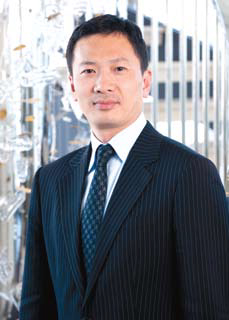
16 Ted Chan
Chief Operating Officer
Melco Crown Entertainment
Thirty-six-year-old Lawrence Ho and his partner, James Packer, who turns 45 this month, are the youngest heads of all the Macau casino concessionaires, and it’s that youth that makes Melco Crown Entertainment innovative, according to COO Ted Chan, who is all of 40 years old himself.
“We are a very young company with young management,” he says. “One of the characteristics of young people is we are not afraid to try new things.”
Mr Chan assumed his current title in February and now oversees both gaming and non-gaming activities across City of Dreams, Altira Macau and Mocha Clubs. For the previous two years he had been co- COO, Gaming, while Nick Naples headed Operations. Nick Naples left the company in conjunction with Mr Chan’s promotion, the culmination of a gradual assumption of all senior roles at the company by Chinese executives.
“The young and innovative culture of this company is bolstered by our understanding of the customer,” says Mr Chan. “Because Lawrence Ho and the
team are actually Chinese, and we grew up in this part of the world, we feel we understand the behavior of customers here better than anybody else.”
It’s a differentiating factor, and for reasons both obvious and subtle, an important one.
“For example,” he explains, “if someone from China comes into your property, [even] if you didn’t grow up in this part of the world and study the
culture in China, you might be able to recognize that person comes from northern China, and from that conclude they like spicy food. But then what’s the difference between this guy and somebody from Thailand?”
As Mr Chan discussed in an interview with Inside Asian Gaming earlier this year, he has been focused on boosting mass market revenues at City of Dreams to bring the property more in line with the strong mass-market performance of its Cotai neighbor Venetian Macao. His efforts appear to be paying dividends, with COD’s 22% year-on-year increase in adjusted EBITDA in the second quarter driven in large part by improved main-floor table games and gaming machine volumes. (Rolling chip volumes were actually down year on year in the quarter, though this was offset by a higher rolling chip win rate.)
A key part of Melco Crown’s mission to boost mass revenues is learning more about its customers’ preferences. “For any strategy setup or marketing initiative the No. 1 goal is to know your customer,” says Mr Chan. “So we spend quite a lot of time understanding customer behavior.”
It helps, too, to have a 600,000-strong data base. “We do a lot of data-mining exercises to find out who are the best customers, the middle customers and smaller customers, who we put into different tiers, so we’ll be able to align the right service to the right type of customer,” he explains. “That enables us to increase the loyalty level of the customer. We’d like to do this with slots and tables, but with slots it’s easier because slot players are used to member cards, and you can track the record of every wager they do. But with table players it’s difficult. There’s no system that offers 100% accurate tracking of table players.”
Mr Chan is a longstanding and trusted associate of Lawrence Ho. He worked with him first at Mocha Clubs, the slot arcade chain started by Melco and now part of the listed Melco Crown joint venture. He left to take a role as CEO of an outside firm, albeit one that worked in close cooperation with Melco Crown—Amax Holdings, a Hong Kong-listed junket aggregator that played a key role in sustaining Crown Macau (now Altira), the joint venture’s first casino, when it opened. By November 2008, Mr Chan was back in the fold as president of Altira prior to assuming the co-COO position at City of Dreams in the summer of 2010.
17 Nicholas Niglio
CEO and Executive Director
Neptune Group
As VIP baccarat growth in Macau takes a breather after a long and heady run, some of the major junkets have taken the opportunity to embark on an acquisition spree, with the industry appearing to be in a consolidation phase.
Neptune Group, one of the biggest junkets, is clearly in expansion mode. On 6th August, Hong Kong-listed Neptune released a statement to the stock exchange providing more information about its expansion plans. Neptune has entered into multiple MOUs to secure interests in the businesses of promoters of the Guangdong 31 Sky Club (consisting of at least 11 tables at the Grand Lisboa generating rolling turnover of at least US$619 million per month over the past six months); the Guangdong VIP Club (24 tables at MGM Macau generating $1.95 billion); and the Wynn Guangdong VIP Club (29 tables at Wynn Macau generating $1.2 billion). Each club takes a 0.4% cut of turnover.
Neptune’s growth has taken place largely over the past four years, in line with Macau’s breakneck development. The group now coordinates the marketing and accounting effort for nearly 200 VIP tables across 10 venues at the best properties in town.
Nick Niglio has played a major role in that rapid growth, joining the group as executive director and COO in 2007 before being promoted to CEO last year. He has been instrumental in negotiating arrangements for superbly appointed rooms at several major properties, including MGM Macau, The Venetian and Four Seasons Macao and Grand Lisboa.
Before the rapid growth of the city’s VIP room business, Neptune Group was probably best known as the operator of a casino cruise. That ship was sold last year to other Macau VIP operators.
A big factor in Neptune’s rise in landbased gaming appears to be the company’s success at making friends. Neptune isn’t necessarily the most aggressive at making commission deals with casinos, but it does seem to have considerable goodwill in the local industry and among players for fair and friendly dealing. That counts for a huge amount in the VIP sector and ultimately pays off in terms of the bottom line. The company’s approach reflects Mr Niglio’s own personality and approach and that of his operational management team.
“It’s truly a relationships business,” says Mr Niglio.
He has extensive experience in relationship management from the US gaming sector, including some 20 years as executive vice president for Caesars World Marketing and executive vice president of Trump Taj Mahal Casino Resort in Atlantic City. In Macau and Hong Kong, Mr Niglio served as a gaming consultant for several large international concerns seeking to position themselves in Asian gaming markets.

18 Tom Hall
Business Development Director
ONEworks
Tom Hall heads global business development for ONEworks, a market leading sports book platform provider that has evolved over the past 10 years to be the chosen supplier to some of the largest sports books in the world. The company has deep roots in Asia’s highly sophisticated and competitive sports betting markets, and having established dominance in the region, has been taking its leading-edge technologies worldwide.
No one is more familiar from an operations standpoint with the preferences of the region’s sports bettors than Tom Hall. He understands the need for bookmaking and book management skills that can cope with high betting volumes, large individual bets and, in particular, Asian gamblers’ favorite—“in-play” (also known as “inrunning”) betting. Such play—gambling on propositions derived from any number of possible outcomes during the live action of a game—may constitute 80% by volume of Internet betting in Asia, according to some industry estimates.
Currently, in-play betting is not as widespread in the rest of the world. In the large and lucrative jurisdictions where online betting is legal in Europe, it accounts for a minority of bets. The reason seems to be that European companies are not keen to take on the high risk and small margins typically considered acceptable by Asian bookmakers. Mr Hall and ONEworks are determined to change that outlook, for the benefit of gamblers and bookmakers alike.
ONEworks offers several versions of its ONEbook platform and associated services to licensees looking to target international, European or Asian markets. ONEbook handles in a typical month more than 18,000 live markets across more than 5,000 in-running soccer games and an additional 1,800 in-running events and 3,000 markets in 29 other sports. There are significant upfront costs in establishing a sophisticated bet management system. But once it’s running and handling large volumes of transactions— up to 250,000 concurrent end-user players have been handled on ONEworks’ systems at peak times—economies of scale come into effect. That means the cost per transaction is significantly reduced compared to traditional Western bookmaking, where the operator manages the customer rather than managing the price, and ONEworks is therefore able to provide a flexible and competitive solution to customers.
Mr Hall is recognized as one of the world’s experts on interactive and online gambling. He came to ONEworks in late 2010 from formerly UK-listed AsianLogic, which he co-founded and helped build into one of Asia’s largest providers of Web gambling and betting services. He still serves as ALOG’s non-executive chairman. ALOG continues growing strongly, with the long-established Dafabet brand one of the most recognized in the region. Dafabet is now the international betting partner of English Premier League football clubs Everton and West Bromwich Albion.
The company is also continuing with its mission to raise poker’s profile throughout Asia. ALOG has been strongly promoting and expanding the reach of the Asian Poker Tour since acquiring it in 2008 and has been pursuing several poker initiatives in both play-for-fun and real-money environments.
Previously, Mr Hall served as group CEO for gaming software and support giant Playtech, where he was responsible for overseeing customer growth and the development of customized software for Asian markets.
19 George Tanasijevich
President and CEO
Marina Bay Sands
At Singapore’s Marina Bay Sands, George Tanasijevich presides over what many consider the most profitable casino in the world. He was instrumental in Las Vegas Sands Corp’s winning the license in the first place, and since then has proved his mettle as the man to steer the operation to new highs.
Although some analysts were disappointed with the second-quarter earnings reported by MBS, they remain confident that the resort has the power to weather the global downturn. Lower rolling chip volume, exacerbated by low hold on VIP table play and higher provisions for accounts receivable, negatively affected results. The casino produced US$330.4 million of adjusted earnings before interest, tax, depreciation and amortization, down 18.5% year on year. But non-rolling chip drop was up 8.2%, slot handle was up 15.1%, and hotel revenues grew 30.1%, showing there is definitely growth in core segments of the operation. This will prove critical to MBS going forward if analysts are correct in their belief that business will remain steady in Singapore, but significant spurts in growth may be hard to come by in the future.
In Mr Tanasijevich’s second role as global head of development, pursuing new projects for LVS worldwide, he is working to secure opportunities to keep the company expanding at the near-exponential rates it has experienced over the past decade through its forays into Macau and Singapore.
A large part of that effort involves lobbying governments of emerging jurisdictions like South Korea and Japan to allow integrated resorts.
“I think he has made a lot of moves, it’s just a lot of it isn’t public,” says one Singapore-based gaming analyst. “Even the simple process of educating government officials, because he does it across many different countries, and most people never hear about it.”
Regional opportunities notwithstanding, Mr Tanasijevich’s famed ability to lobby regulators will be tested in his home market of Singapore as the Casino Regulatory Authority looks set to introduce tougher restrictions on local players. The mooted changes to the Casino Control Act include limits on the frequency of visits for financially vulnerable gamblers as well as increased fines on the casinos for violations and caps on the commissions paid to junket operators.
And although Sheldon Adelson has aid that the new rules don’t worry him, Mr Tanasijevich will no doubt have his hands full dealing with them.
20 Chen Lip Keong
CEO and Executive Director
NagaCorp
Chen Lip Keong made a huge bet and won.
In 1994, as efforts were still under way to bring peace to Cambodia after years of civil war, the former medical doctor from Malaysia put in
a bid to open a casino in the country. The odds were certainly against him. With no experience in gaming, he set out to get into the business when the Khmer Rouge was still active and it was not even clear whether the new government would survive. And he proposed making the investment well before regional mass tourism had taken off, a decade before Asia’s casino boom got rolling, and at a time when China was still very poor, its economy weak and its people unable to travel easily outside their country.
The unlikely venture, launched on a barge on the Mekong River, got started slowly. But since then, NagaCorp’s success has closely tracked Cambodia’s progress as a nation and grown with it. The first Cambodian company to list on the Hong Kong Stock Exchange, it has played an integral role in shaping the country’s increasing appeal among tourists, investors and the international business community.
For one thing, Dr Chen has delegated well, hiring Timothy McNally, an FBI veteran, as NagaCorp’s chairman and compliance watchdog, a good move in a young country like Cambodia; and in Philip Lee he has a detail-oriented CPA in charge of the financial side. In 2011, NagaCorp’s profits more than doubled, and in the first half of 2012, they rose 14% year on year. From a historic low of HK$0.56 in 2009, when the shares were caught up in the global financial crisis, the stock has surged back and has been trading consistently above $4.
Dr Chen has parlayed that success into a position of influence in his host country, where his connections in government are reputed to be among the best. And the gamble he took all those years ago has rewarded him handsomely. His 50.04% stake in NagaCorp is part of a fortune that includes holdings in manufacturing, travel and property and infrastructure development estimated by Forbes magazine at US$600 million, ranking him as the 17th richest person in Malaysia.
Next: The Asian Gaming 50 – 2012: 21-30







